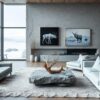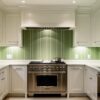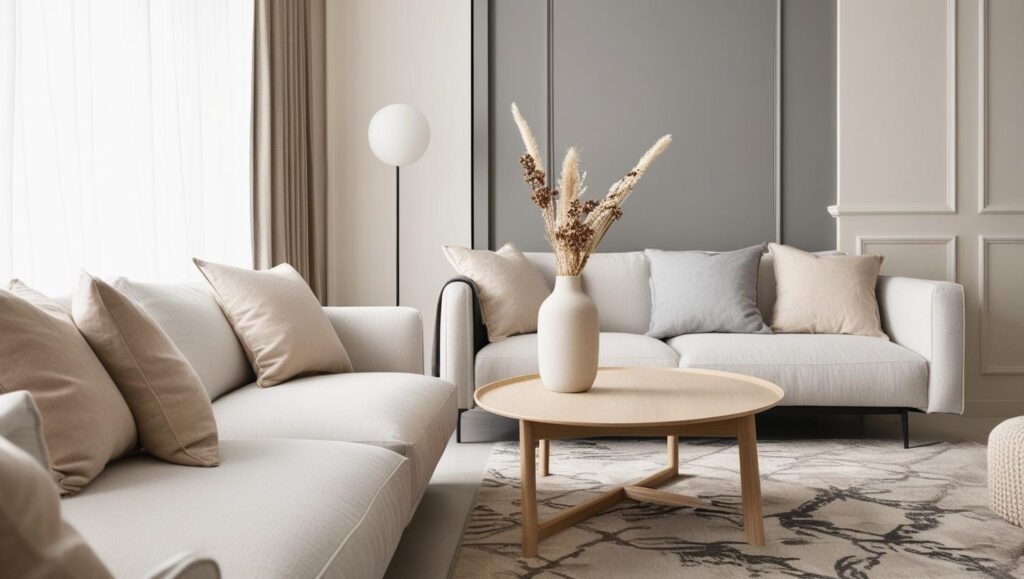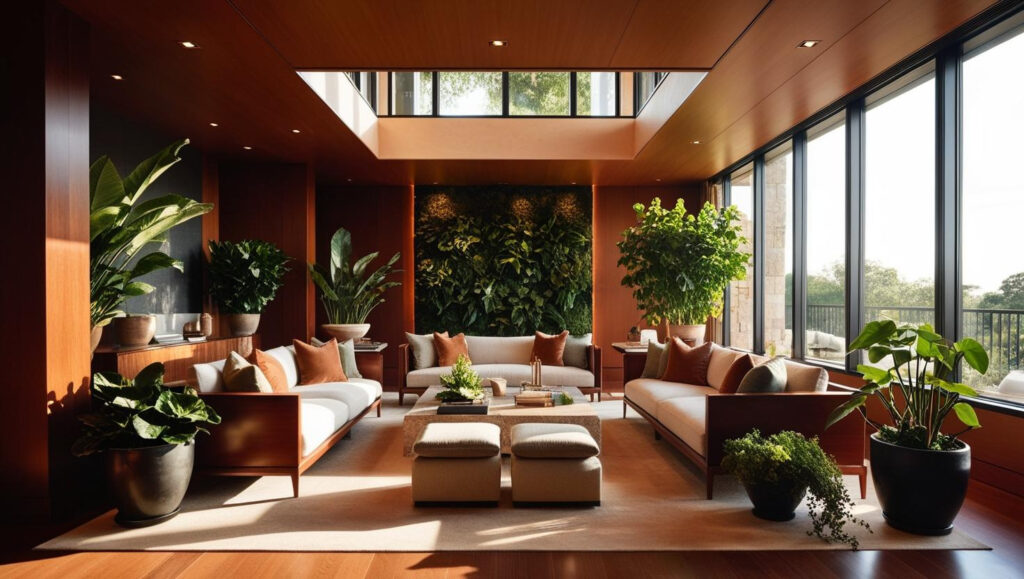- Understanding the Fundamentals of Home Design vs Home Decor
- The Scope and Purpose of Home Design
- Essential Elements of Home Decor
- Professional Requirements: Designers vs Decorators
- The Role of Space Planning in Home Design
- Transforming Spaces Through Decorative Elements
- Budget Considerations: Design vs Decor Projects
- When to Hire a Designer vs a Decorator
- Common Misconceptions About Home Design and Decor
- Conclusion: Creating Your Perfect Living Space
Many people mix up home design and home decor, but they’re not the same. Home design is about making a space both beautiful and useful. It’s about planning the layout and choosing furniture that works well together. On the other hand, home decor is all about adding touches that make a room look good.
Key Takeaways
- Home design is about creating spaces that are both functional and beautiful.
- Home decor is about adding decorative elements to enhance a room’s look and feel.
- Interior design is key in home design, shaping the layout and function of a space.
- Home design and home decor are two different fields that need different skills and approaches.
- Knowing the difference helps you make better choices when designing and decorating your home.
- A well-thought-out home design can boost your home’s value and comfort.
Understanding the Fundamentals of Home Design vs Home Decor
Creating a beautiful and functional living space is key. Home design focuses on making a space work well, considering layout and furniture. Home decor, on the other hand, is about making a room look good, with colors and textures.
Home styling is a big part of home design. It makes a space look good and show off the homeowner’s style. This is done by choosing furniture and accessories carefully.
Defining Home Design
Home design covers many areas, like architecture and interior design. It aims to make a space that works well for the family. This includes how rooms are laid out and where furniture goes.
Defining Home Decor
Home decor is all about making a room look nice. It involves picking out accessories and colors. This makes a space that looks good and feels welcoming.
Key Differences Between the Two Disciplines
Home design and home decor have different focuses. Design is about making a space useful, while decor is about making it look good. Knowing this helps create a space that is both functional and stylish.
| Discipline | Focus | Approach |
|---|---|---|
| Home Design | Functional and efficient space | Room layout, furniture placement, traffic flow |
| Home Decor | Visually appealing space | Decorative accessories, color schemes, textiles |

The Scope and Purpose of Home Design
Home design is more than just picking furniture. It includes space planning, choosing furniture, and home renovation. The main aim is to make a home that is both useful and cozy. Designers consider things like lifestyle, budget, and personal style to create homes that improve life quality.
A well-designed home can greatly improve your health and mood. The benefits include:
- Improved functionality and efficiency
- Enhanced aesthetic appeal
- Increased comfort and relaxation
- Better space planning to accommodate specific needs and activities
When it comes to home renovation, good design makes the process easier. By focusing on space planning and other key areas, people can make their homes both lovely and practical.
At its core, home design aims to create a space that boosts well-being and happiness. By taking a comprehensive and informed design approach, people can turn their homes into lively and caring places. This enhances their life quality.
Essential Elements of Home Decor
Creating a beautiful and welcoming home involves several key elements. Decorative accessories like vases, artwork, and rugs bring personality to any room. A well-picked color scheme also sets the mood and tone of a space.
Textiles and soft furnishings, such as throw pillows and blankets, add warmth and texture. These elements help create a stylish and cohesive look that shows off your taste. Here are some ways to use textiles in your decor:
- Using throw pillows and blankets to add color and texture to a room
- Incorporating patterned rugs and mats to add visual interest
- Adding decorative wall hangings and tapestries to create a unique focal point

By choosing these elements carefully, homeowners can make their space both beautiful and functional. Whether updating one room or your whole home, focusing on these elements helps create a space that’s truly yours.
Professional Requirements: Designers vs Decorators
Professionals in interior design need a solid base in home design vs home decor. They must understand space planning, function, and looks. Decorators mainly work on the looks, like colors, fabrics, and extras.
Designers and decorators have different roles and needs. Designers need formal education and skills. They must know about building rules, green design, and design for everyone.

- Spatial planning and design
- Building codes and regulations
- Sustainability and environmental design
- Universal design principles
- Communication and project management skills
Knowing the differences helps homeowners choose the right person for their home design or decor project. This ensures their space is both useful and looks great.
The Role of Space Planning in Home Design
Space planning is key to making a living space work well. It’s about arranging rooms and furniture to create a smooth and useful area. Good space planning can really improve life at home, making it a vital part of design.
Designers think about how people move and use different areas when planning. For example, a smart layout can cut down on traffic and make moving around easier. They also consider how to divide a room for different activities. Things like windows and doors help shape the room’s layout too.

- Assessing the room’s dimensions and shape to determine the best layout
- Selecting furniture that is proportionate to the room and its intended use
- Creating a functional zoning plan to define different areas of the room
By planning carefully, homeowners can make a space that looks good and works well. It should fit their needs and how they live.
| Space Planning Considerations | Importance |
|---|---|
| Room layout | High |
| Furniture placement | High |
| Functional zoning | Medium |
| Architectural elements | Medium |
Transforming Spaces Through Decorative Elements
Decorative accessories are key in changing a space. They add a personal touch to any room. A good color scheme also sets the mood of the space. Plus, textiles like throw pillows and rugs bring warmth and texture.
Here are some ways to change a space with decor:
- Adding a statement piece of furniture
- Incorporating a bold color scheme
- Using textiles to add warmth and texture
- Accessorizing with decorative pieces, such as vases or sculptures
Choosing and mixing these elements thoughtfully can make a space unique and welcoming. A well-designed space can improve your mood and well-being.

Budget Considerations: Design vs Decor Projects
When planning home design and decor, budget is key. Home renovations need a big upfront cost. But, they can save money in the long run by improving space and furniture use.
Space planning is crucial in home renovation. It makes rooms more functional and beautiful. By placing furniture wisely, homes become more comfortable and valuable.
Here are some budget tips for design and decor projects:
- Initial investment: Home design projects, such as home renovation, often require a significant upfront investment.
- Long-term value: Effective space planning and furniture placement can provide long-term value and savings.
- Cost-saving strategies: Homeowners can reduce costs by prioritizing needs over wants and exploring affordable design and decor options.
Understanding the costs and benefits of design and decor projects helps homeowners. They can plan their budget better. This way, they can make their homes beautiful and functional through renovation and smart space planning.
| Project Type | Initial Investment | Long-term Value |
|---|---|---|
| Home Renovation | High | High |
| Home Decor | Low | Low |
When to Hire a Designer vs a Decorator
Homeowners often wonder if they should hire a designer or a decorator. The choice depends on the project’s size and complexity. For big, complex projects like home renovations, a designer is often the best choice. They offer expertise in interior design and help with planning and architectural elements.
For smaller, decorative projects, a decorator might be a better fit. They help with home design vs home decor choices, like picking colors and textures. Homeowners should think about the project’s scope and timeline before deciding.
Project Scope Evaluation
When evaluating the project scope, consider these factors:
- Size and complexity of the project
- Budget and cost considerations
- Desired outcome and aesthetic
By looking at these factors, homeowners can decide between a designer or a decorator. This ensures their project is done on time and within budget.
Timeline Considerations
Timeline is key when choosing between a designer and a decorator. Think about:
- Project duration and deadlines
- Availability of the designer or decorator
- Lead time for materials and furnishings
Considering these, homeowners can plan a realistic timeline. They can then pick the right professional for their interior design needs.
The success of a home design vs home decor project depends on the right choice. By evaluating scope and timeline, homeowners can make a smart decision. They can create a beautiful, functional space that meets their needs and exceeds their expectations.
| Project Type | Designer | Decorator |
|---|---|---|
| Home Renovation | Recommended | Not recommended |
| Decorative Project | Not necessary | Recommended |
Common Misconceptions About Home Design and Decor
Many people think home styling is just about looks. They believe decor is all about personal taste. But, home design and decor are more than that. They involve functionality, sustainability, and budget too.
A good room layout can change a space a lot. It’s not just about furniture looking good. It’s about making a space functional and comfy. Where you put furniture is key. It affects how people move and the room’s feel.
Some common wrong ideas about home design and decor are:
- Believing home design is only about looks
- Thinking decor is all about personal taste
- Ignoring the need for functionality and sustainability
- Not seeing how furniture placement changes a room’s feel
Knowing these wrong ideas helps homeowners see their projects in a new light. Whether it’s styling, layout, or furniture, think about all the factors. This way, you can create a space that’s both beautiful and practical.
Conclusion: Creating Your Perfect Living Space
Making your living space perfect is all about mixing home design and decor. Knowing how each part works helps you turn your home into a place that looks good and works well. Whether you’re redoing your whole house or just updating your decor, start with a clear idea of what you want.
Find the right mix of structure and style to make your home special. This guide has given you the tools to choose wisely and make your home a place you love. It will become a space that shows off who you are and makes you happy every day.








